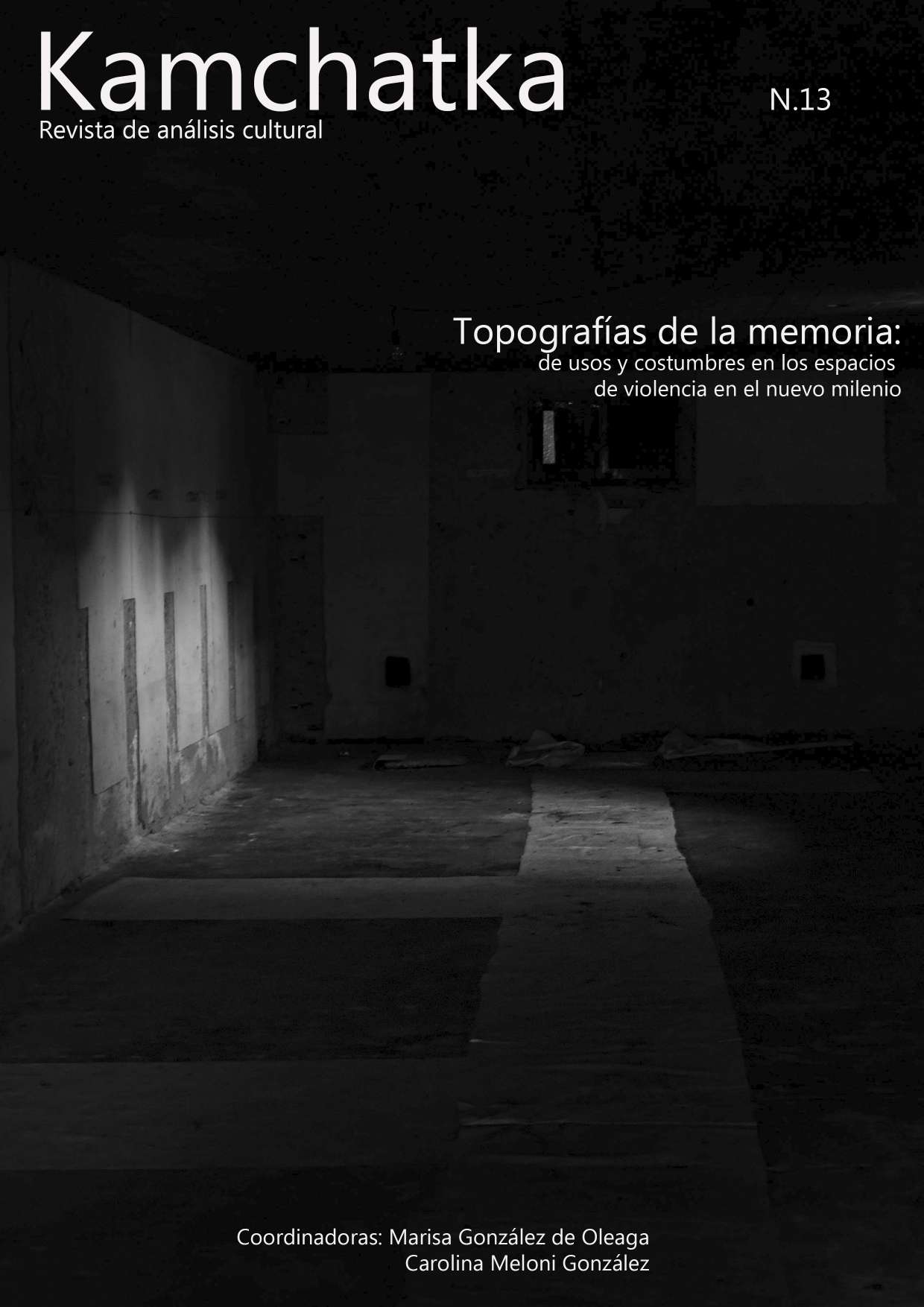(Re)construction of a Recent Past: Memory and Writing in Uruguay: The Case of Oblivion by Edda Fabbri
DOI:
https://doi.org/10.7203/KAM.13.13126Keywords:
Testimonial Writing, Memory, Time, Body, Oblivion, Forgiveness. Abstract
Abstract
The testimonial literature that emerges during the late 1990s in Latin America has as a main theme the rescue of the memory centered on State violence during the military dictatorships that occurred in previous decades. In the Uruguayan case, the testimonial writing from former female political prisoners will account for the silent and stormy life behind bars, and for the necessary companion relationships that make possible to resist. One example of this is Oblivion by Edda Fabbri, a testimonial novel awarded with the Casa de las Américas Prize in 2007. The purpose of this article is to identify how, in Oblivion, the testimonial voice of a former political prisoner who was a member of the Tupamaros National Liberation Movement tries to reconstruct the memory of her past as a prisoner through a series of fragmented images kept in her body. The writing, although insufficient, will be established as the means by which the speaker will express the pain, with no intention of focusing on facts, but with the purpose of leaving a trace of a violent past, which, in turn, allows to seek forgiveness. The paradox between memory and oblivion constantly present in the testimony plays a major role in such a search. The analysis will center its attention on three major themes for discussion: the link between time and memory, the connection between pain, body and writing, and the idea of oblivion as forgiveness.
 Downloads
Downloads
 References
References
Alzugarat, Alfredo (2007). Trincheras de papel. Dictadura y literatura carcelaria en Uruguay. Montevideo: Ediciones Trilce.
Blixen, Carina (2010). “Deber de memoria y derecho al olvido: testimonio y literatura a partir de la experiencia de la dictadura cívico-militar (1973-1985) en Uruguay”. Actas de La mémoire et ses représentations esthétiques en Amérique Latine, Rennes. Consultado el 15/09/2017.
Buriano, Ana. “Derecho, trauma social y restitución. Sincronía y unicidad: el caso de Uruguay”. Andamios 18 (2012): 89-116.
Casaña, Inés y Fornet, Jorge (eds.) (2004). Premio Casa de las Américas. Memoria (2000-2004). La Habana: Fondo Editorial Casa de las Américas.
Draper, Susana. “Victimes du souvenir et de l’oubli”. Témoigner. Entre histoire et mémoire 118 (2014): 121-127. DOI: 10.4000/temoigner.961. Consultado el 14/04/2019.
Fabbri, Edda (2012). Oblivion. Montevideo: Letraeñe.
Forcinito, Ana (2012). Los umbrales del testimonio. Entre las narraciones de los sobrevivientes y las señas de la posdictadura. Madrid: Iberoamericana.
Forcinito, Ana. “La voz visible. Un acercamiento al testimonio de ex presos políticos en Uruguay”. Kamchatka. Revista de análisis cultural 6 (2015): 529-547. DOI: 10.7203/KAM.6.6402. Consultado el 20/04/2018.
Forné, Anna. “La autoficción testimonial: Oblivion de Edda Fabbri”. Telar. Revista del Instituto Interdisciplinario de Estudios Latinoamericanos 7-8 (2010): 63-75. Consultado el 06/04/2018.
Fried, Gabriela. “Trauma social, memoria colectiva y paradojas de las políticas de Olvido en el Uruguay tras el terror de Estado (1973-1985): memoria generacional de la post-dictadura (1985-2015)”. ILCEA 26 (2016): 1-23. DOI: 10.4000/ilcea.3938. Consultado el 06/05/2018.
Gilio, María Esther. “Entrevista a Silvia Bleichmar”. Semanario Brecha, Montevideo, 31/05/2002.
Hormilla, Hellen. “La memoria es un derecho, el olvido una capacidad. Entrevista con Edda Fabbri”. La Jiribilla. Revista Cubana de Cultura 613 (2013). Consultado el 21/11/2017.
Jelin, Elizabeth (2002). Los trabajos de la memoria. Madrid: Siglo XXI.
Lorente, Nuria. “La memoria: un campo en disputa. Usos y desusos del pasado reciente uruguayo”. Kamchatka. Revista de análisis cultural 8 (2016): 275-302. DOI: 10.7203/KAM. 8.9157. Consultado el 20/04/2018.
Nieto, Judith. “El deber de la memoria, la imposibilidad del olvido. Alcances ético-políticos”. Reflexión política 15 (2006): 80-92.
Peris, Jaume (2005). La imposible voz. Memoria y representación de los campos de concentración en Chile: la posición del testigo. Santiago de Chile: Cuarto Propio.
Peris, Jaume (2008). Historia del testimonio chileno. De las estrategias de denuncia a las políticas de memoria. Valencia: Quaderns de Filologia.
Peris, Jaume. “Literatura y testimonio: un debate”. Puentes. Revista de crítica literaria y cultural 1 (2014): 10-17.
Ricoeur, Paul (1999). La lectura del tiempo pasado: memoria y olvido. Madrid: Arrecife-Universidad Autónoma de Madrid.
Ricoeur, Paul (2010). La memoria, la historia, el olvido. Madrid: Trotta.
Roca, Fanscesc (1998). “Trauma: tragedia y tiempo”. Estudios Psicoanalíticos 4. Trauma y discurso. Málaga: Eolia: 77-87.
Salvi, Lucas. “El juramento y la historia. Sobre Oblivion de Edda Fabbri”. Lingue e Linguaggi 17 (2016): 245-260. DOI 10.1285/i22390359v17p245. Consultado el 31/05/2018.
Sartre, Jean-Paul (1993). El ser y la nada. Ensayo de ontología fenomenológica. Buenos Aires: Editorial Losada.
Strejilevich, Nora (2006). El arte de no olvidar. Literatura testimonial en Chile, Argentina y Uruguay entre los 80 y los 90. Buenos Aires: Catálogos.
Downloads
Published
How to Cite
-
Abstract1070
-
Artículo (Español)513
Issue
Section
License
This journal provides an immediate free access to the content on the principle that freely make investigation available to the public, which promotes an increased global knowledge exchange.
Unless otherwise indicated, texts published in this journal are under the license Attribution-NonComercial 4.0 by Creative Commons. These texts may be copied, distributed and publicly communicated whenever the publication’s author and title are quoted and whenever they are not used for commercial purposes. In any case, intellectual property of the articles and its potential economic rights entirely belong to its authors.
The full license can be consulted on https://creativecommons.org/licenses/by-nc/4.0/. We encourage authors to disseminate papers published in Kamchatka. Journal of cultural analysis electronically, in institutional digital repository or in their websites.





